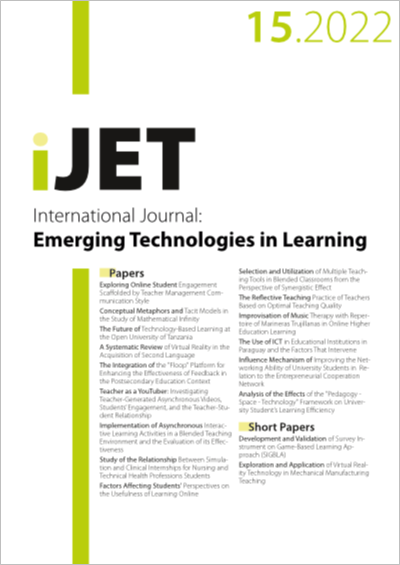Exploring Online Student Engagement Scaffolded by Teacher Management Communication Style
DOI:
https://doi.org/10.3991/ijet.v17i15.31513Keywords:
Learning Experience, Online Student Engagement, Pedagogy, Scaffolding, Teacher Management Communication StyleAbstract
Prior studies of online student engagement generated insufficient information in longitudinal study and the scaffolding factors on the part of the teachers. To address this gap, this study proposed the approach of Teacher Management Communication Style and conducted the longitudinal quasi-experiment study for 8 weeks. A combination of 5-point Likert scale of Online Student Engagement (OSE), the self-designed Student Actual Online Learning Experience (SAOLE) and Student Perceived Offline Learning Experience (SPOLE) were administered in three stages (Week 1, Week 4 and Week 8) to a total amount of 117 learners from 3 intact classes in a prestigious research university in P.R.China.
Statistical analysis, resulting from repeated measure ANOVA and Paired Samples t-tests, showed that there was a significant increase in Online Student Engagement in general and all the four factors of Skill, Emotion, Performance and Participation between stage 1 and stage 3. Further analysis showed the fluctuating yet increasing trend of Online Student Engagement in general and the three factors of Skill, Emotion and Participation between both stage 1 and stage 2, but no signficant difference between stage 2 and sage 3. The third factor of participation showed no signficant increase in both stage comparisons. In addition, the study resuls indicated that the learners’ perceptions towards online learning and their intention to share the learning experience was signficant higher than those towards perceived offline experience.
The findings shed lights on the pedagogy scaffolded by Management Communication Style and delineate the picture at a fine-grained level of online learning engagement along the 8-week long and 3-stage process. Future efforts could direct to further examining the comparison of the learners in terms of gender, age, education background, and of different time duration of learning.
Downloads
Published
How to Cite
Issue
Section
License
Copyright (c) 2022 Li Xiangming, Xuejing Zhang, Xiaoling Zeng, Jingshun Zhang

This work is licensed under a Creative Commons Attribution 4.0 International License.



